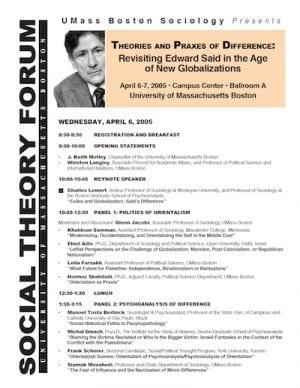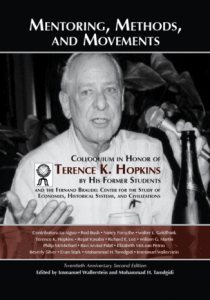Proceedings Journal Article — Said & “Edward”: Dispossession and Overcoming Nostalgia — by Charles Lemert
$15.00
Edward Said’s politics of dispossession are truly original as well as bold and important. Out of Place (1999), like many memoirs of childhood, could well have been nostalgic, at least to the extent of romanticizing his Palestinian past. Yet, the book is anything but. Said tells his story at the literary remove he invents in order to open a space for the distances in the story—the social distances from his family, his late coming to terms with the politics of dispossession, his career in English literature as distant from the orientalist attributes of Anglophone culture, the political and economic distances between his family comforts and misery of the Palestinians he devoted himself to serving.
Description
Abstract
Edward Said’s politics of dispossession are truly original as well as bold and important. Out of Place (1999), like many memoirs of childhood, could well have been nostalgic, at least to the extent of romanticizing his Palestinian past. Yet, the book is anything but. Said tells his story at the literary remove he invents in order to open a space for the distances in the story—the social distances from his family, his late coming to terms with the politics of dispossession, his career in English literature as distant from the orientalist attributes of Anglophone culture, the political and economic distances between his family comforts and misery of the Palestinians he devoted himself to serving.
Said himself was distant by every measure from the truly dispossessed, the economically uprooted, and the socially unsettled. Yet, having settled deeply into the higher cultural circles of the West, he did not lapse into sentimentality for his past. Out of Place is very much a story of childhood, but very much NOT nostalgic. It could not have had the effect it has had had it been. And, this, when it comes to literary work is as much a political as a cultural accomplishment. Rather, for him, this book and all the books of his career were cultural achievements only to the extent that they were based, either biographically or historically, in the politics of his own dispossession within (and at odds with) Palestinian dispossession. Though the types of dispossession differ in degree and kind, Said is surely right. Like it or not, to do the critical work of using one’s elite cultural capital to unsettle the world is to become an exile—even a traitor to the class, even a terror to the prevailing culture. One cannot do social theory without being an exile.
The modern world of the liberal romance, so pleased with itself that it welcomes the uprooted, has never taken well to free-floating intellectual social critics, many of whom find their way to prisons of other or another kind. Against the modern, Said set the Palestinian as a global figure able to confront the global world as it is by repossessing what had been lost—not by a crude fundamentalism of the original, but by a daring new beginning of a story already being told.
Recommended Citation
Lemert، Charles. 2005. “Said & “Edward”: Dispossession and Overcoming Nostalgia.” Pp. 5-18 in Theories and Praxes of Difference: Revisiting Edward Said in the Age of New Globalizations: Proceedings of the Second Annual Social Theory Forum, April 6-7, 2005 (Discourse of Sociological Practice, Vol. 7, Issues 1&2, Fall/Spring 2005). Double-Issue Guest Editor: Mohammad H. Tamdgidi. Sociology Department, UMass Boston.
Read the Above Publication Online
To read the above publication online, you need to be logged in as an OKCIR Library member with a valid access. In that case just click on the large PDF icon below to access the publication. Make sure you refresh your browser page after logging in.






